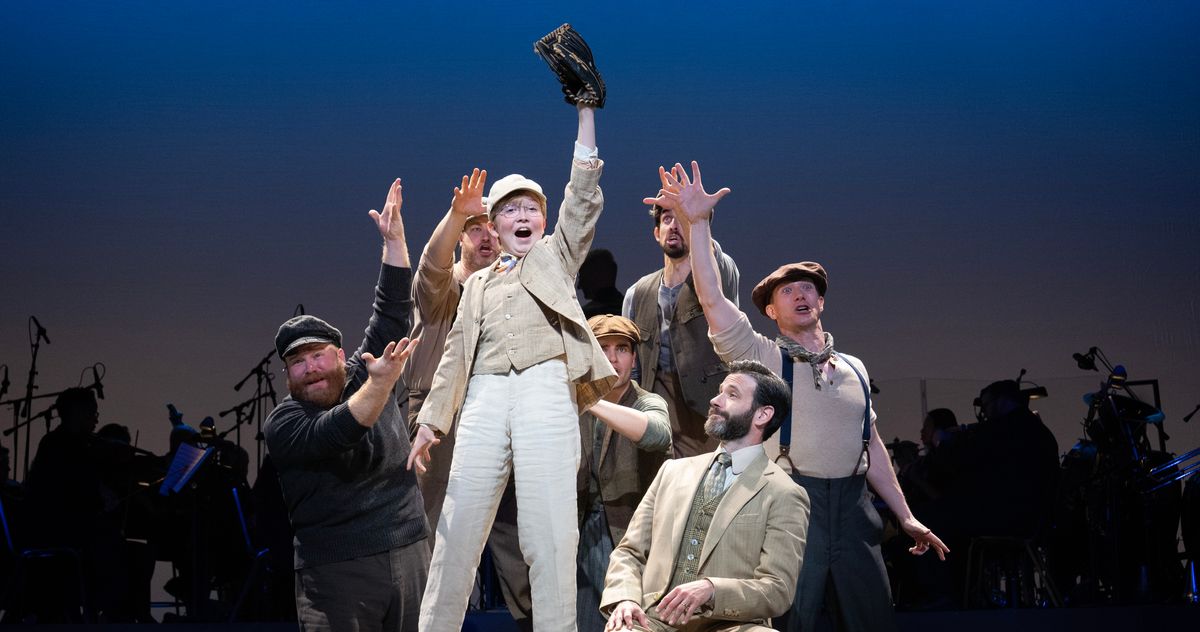From Ragtime, at City Center.
Photo: Joan Marcus
Over the past few years, as New York City Center’s program of musical revivals has inched toward this millennium, it has embarked on a grand journey into what I’ve come to realize was the thriving 1990s mini-genre of the Americana pageant musical: Parade, Titanic, and now, with this year’s fall gala, Ragtime. They braid fiction and historical events, move with a stately grandeur, and lean hard on AP U.S. History didacticism. With its enfolding quilt of a score by Stephen Flaherty, lyrics by Lynn Ahrens of the kind that could be inscribed on a plaque, and book by Terrence McNally, all based on E.L. Doctorow’s landmark novel, Ragtime marks an apex for that form, the grandest Americana of all—if not necessarily the most “American,” considering the heavy hand of checkered Toronto theater impresario Garth Drabinsky in its making. (The recent flameout Paradise Square was his attempt to revive the genre and his career; I recommend a good Google there.) When a show like this works, it can hit with a wallop of “what is America” sentiment, and in this case that’s very much the aim. With a fraught election right ahead, City Center is deploying Ragtime for maximum thematic impact, enlisting a battalion of theater stars to praise those wheels of a dream to the high heaven. I wish it generated more feeling than a sense of blowing the speakers out, both literally and thematically.
Lear deBessonet (the City Center Encores! program’s artistic director, departing after this season to Lincoln Center Theater) pursues an unadorned tack similar to the ones she’s taken with Into the Woods and, more recently, Once Upon a Mattress. This is technically a “gala presentation” not part of Encores!’s season, but the dynamics are familiar: As with most Encores! stagings, we’re a few steps away from a straight concert but well short of a full production. David Rockwell’s scenic design places the stars and stripes—a flag either shredded by the wind or materializing at sunrise, your choice—behind the orchestra, and then inserts the necessary bits of set dressing by way of minimal gestures. When Father (Colin Donnell, beard-forward) heads off on his Arctic expedition, passing the Latvian immigrant Tateh (Brandon Uranowitz, coat-forward) in the harbor, the two stand atop wheeled staircases. Joshua Henry’s Coalhouse Walker Jr.’s much-loved Ford Model T descends in a few pieces from the rafters, which also contain Evelyn Nesbit’s swing. But for the most part, deBessonet works with a bare stage and generally on-the-nose choreography from Ellenore Scott. Her onstage pictures cut to the chase: We first see a piano where a Black boy and a white boy meet and start to play together. As they’re introduced in the prologue, the three groups of main characters (white, Black, largely Jewish immigrants) circle one another and then blend into mixed groups, contrapuntally. America, we’re a melting pot.
This approach shifts the focus to the score, and William David Brohn’s orchestrations do get a lot of love from that big orchestra. The skittering piano melodies of the titular genre build into tectonic orchestral sweep—it’s music, in a way that’s fitting considering that the New Rochelle family runs a fireworks factory, to set off fireworks to. But in the case of this Ragtime, where you might hope the minimal take would reveal a solid core, what you instead feel is an absence and a nagging hint that the pageantry was the point. So much of McNally’s book, as it edits and sentimentalizes Doctorow’s, depends on pointing: Characters, whether real or imagined, narrating the events of other characters’ lives. The plot has a core white family of New Rochelle—Father, plus Mother (Caissie Levy), Younger Brother (Ben Levi Ross)—encounter the Black pianist Coalhouse by way of his lover Sarah (Nichelle Lewis) who has tried to bury their child in their yard. Meanwhile Tateh and his daughter work their way through the tenements toward better lives, encountering the radical Emma Goldman (Shaina Taub, who’s come over from Suffs and reveals her own musical’s debt to Ragtime’s genre in the process) and eventually intersecting with everyone else. Ragtime has its moments of gripping drama and violence, but much of what’s stitching all this together gets silly fast if, as is the case here, there isn’t a solid intention in the binding. You may be able to sing along to those anthems like “Wheels of a Dream” or “Till We Reach That Day.” You probably have forgotten the exhausting number about baseball, or the fact that the Little Boy, for some reason gifted with prophecy, keeps trying to warn Houdini about the assassination of Archduke Ferdinand.
As is not uncommon at Encores!, the cast members have come in with solid takes on their characters, but given the quick 11-day rehearsal, they don’t really cohere, nor has DeBessonet given them a unifying approach to take in performance. Henry’s Coalhouse is pure, earnest intensity; he sings like he’s pumping oxygen over embers deep in his chest. Lewis, across from him, hasn’t found her footing. A veteran of The Wiz, she can sing with power, and she gives Sarah a fearsome anger, but her upper register is pinched and straining during “Your Daddy’s Son.” (I don’t envy anyone who has to follow the footsteps of Audra McDonald.) Levy, who can go Vegas big (she was Elsa in Frozen), is admirably restrained here. Her Mother’s prim politeness only gradually gives way to discovery, so when she finally does let loose in the proto-feminist belter “Back to Before,” the effect is like a rainstorm rushing in after a long drought. Uranowitz, whose Tateh eventually takes his place across from her, provides wiry enthusiasm and pomposity once Tateh makes it in the movies. This is a show that offers any number of possible interpretations: It’s a tragedy, it’s a love story, it’s a takedown of American dreams, it’s a hopeful story about the solidarity that comes when you give up those dreams, it’s a 1990s End of History vision of America coming together as a blended nuclear family that loves driving their car. This production has looked at the options and decided to say, “yes, and.” It glides from Coalhouse’s death to that rousing, melancholy “Make Them Hear You” to its happier epilogue and that final reprise of “Wheels of a Dream” where, under James Moore’s musical direction, the crescendo cuts out into an eerie, final, whispered “dream,” as if to say, or maybe not!
But what do you get when you stand back and let the piece’s contradictions speak? A Rorschach Ragtime that means many things at once, just take your pick. The agnosticism, I’m guessing, is due in no small part to the performance schedule. Everyone in the audience knows there’s an election on Tuesday, after which this production will, by force of context, simply have to become either tragic or triumphant for the final week of its run. Just as in American Idol, the public decides! Soon, we’ll all learn whether this country was a good or bad idea. That hangs a lot of weight on electoral politics, and as with that teenybopper Romeo & Juliet and the star-packed Our Town, puts this Ragtime in the frustrating position of deriving gravitas from this upcoming moment in American history while, in fact, saying very little about it. If I had to name what I imagine to be the one underlying theme in Ragtime, it’s that there’s always, in America, new music playing, and a rush to forget the past and sing along. The future is one intoxicating melody. But if it’s all you pay attention to, you miss the sound of what’s already playing now.
Ragtime is at New York City Center through November 10.















